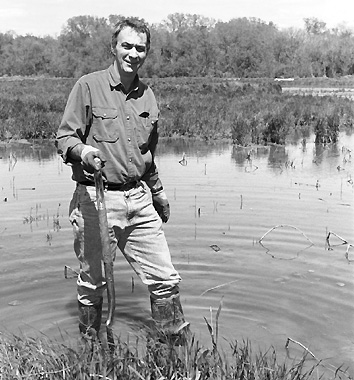'Wetland Warrior' - Baylor Biologist Helping Preserve Natural Habitats

Rubber boots are popular with Dr. Robert D. Doyle, who spends many hours working at Waco?s wetland project.
by Judy Long
You might say that Baylor biologist Robert D. Doyle, who is playing a leading role in maintaining Waco's wetlands, is fulfilling his destiny. The associate professor of biology first learned the value of preserving natural habitats in childhood.
"I grew up in the world's largest wetland -- the Amazon River basin," he said.
The son of Baptist missionaries in Rio de Janeiro, Dr. Doyle spent his childhood near the rain forest and learned to speak Portuguese, using that language in all of his school work until coming to Baylor as an undergraduate. His language skills came in handy later when he returned to Brazil to engage in postdoctoral research of aquatic plants in the Amazon wetlands.
Dr. Doyle decided on his career field early. As an 11-year-old canoeing the Amazon River with his father, they met a botanist who was classifying tropical plants.
"I decided that if he could make a living doing that stuff, that's what I was going to do," Dr. Doyle said. "My interest in aquatic plants goes way back. No one was surprised that I became a botanist."
Dr. Doyle eventually returned to his native Texas to live.
"I married a Texan. I didn't know that if you marry a Texan, you have to live there the rest of your life," he said with a laugh.
In August 2001 -- after coming to Baylor from a teaching job at the University of North Texas (UNT) -- Dr. Doyle began working with University colleagues and Central Texas officials on a project to preserve local wetlands.
"Waco's wetland project is an agreement with the state of Texas to create a habitat in exchange for the loss of habitat that will occur when Lake Waco is raised seven feet," he said.
The current six-acre wetlands site - adjacent to the Bosque River where it flows into Lake Waco -- is the beginning. The local wetland eventually will cover 175 acres.
"It's what they call an off-channel wetland," Dr. Doyle said. "They are going to pump water out of the North Bosque, dump it in to the wetland, let it trickle through the wetland, overflow and spill back into the Bosque."
The Waco wetland received more than Dr. Doyle's expertise. He also has provided a surplus of aquatic plants used in research projects he conducted at UNT. The UNT research projects ended with Dr. Doyle's departure, so he arranged to donate the plants to the Waco project. The plants were introduced into the wetland by Dr. Doyle, Baylor students and other volunteers in October 2001 and March 2002.
The wetlands project also could be the foundation for future multiorganization cooperation if Baylor establishes a water research center. Preliminary plans call for the center to be an interdisciplinary research program to be used by Baylor, the city of Waco and the Brazos River Authority. Dr. Doyle said Baylor water researchers in biology, geology, environmental studies and possibly chemistry could contribute to the center.
Dr. Doyle is confident the cooperation needed to make the new center work can be achieved, based on the success of a similar program begun at UNT that had a long history of cooperation with the city of Denton.
"It was a structure for allowing the city, with applied needs, and the university, with more basic research needs, to meet in the middle to solve pollution and water treatment problems," he said. "It worked remarkably well and gave the students an opportunity to work with the city. We hope to see this sort of collaboration between Waco and Baylor's water research center, just as we're experiencing with the wetland project," he said.